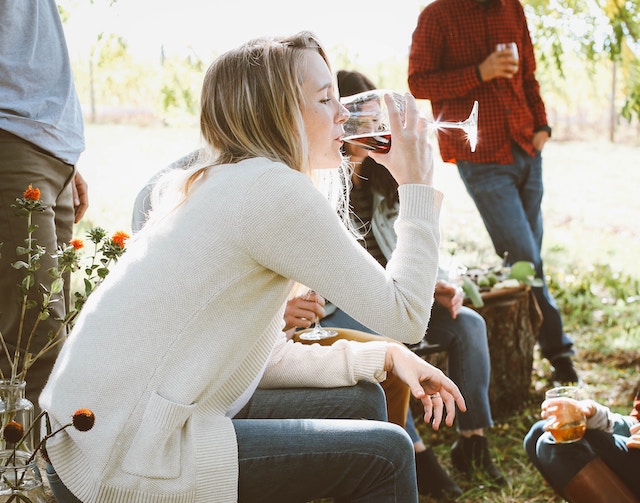This article is created in collaboration with Ana Verzone—an Elephant Mindful Partner. Ana is a Buddhist life coach, dedicated to bringing mindfulness to the real world. We’re honored to share her offerings with you. ~ ed.
I’m not an alcoholic. I’m just someone who wanted to drink less.
I was never a candidate for AA. I wasn’t going to rehab. I didn’t need a therapist.
My life was awesome; I was genuinely happy—and I really liked wine. I just felt like crap when I drank too much of it, and had a pretty hard time cutting back.
My drinking wasn’t even a huge problem. It was a small problem. It was a problem like too many potato chips—affecting me negatively, but not my family or my friends or my work. And yet, when I looked for help it seemed there was nobody out there who could just tell me how to drink less.
You see, I didn’t want to quit drinking altogether. I just wanted to stop over-drinking. I didn’t want to go to meetings or get a sponsor. I didn’t want to do 12 steps. I didn’t want to always be sober. I just needed less chardonnay per night. You know, the middle way of moderation.
So in the end, I helped myself, cutting back using a hefty dose of mindfulness, the science of habits, plus all the life coaching and health coaching tools I know. I’m not a psychologist, but I am a Master Certified Life Coach, Mindfulness Meditation Teacher, and an Integrative Nurse Practitioner, which helped me know enough to be effective—and effective was all I needed.
Start changing your own relationship with alcohol today:
Get my Free Training Video >>
The 4 Steps that Helped me Cut Back on the Booze, for Good.
In my life coaching programs, I use a lot of tools to help people do things like finally free themselves of anxiety, create the confidence they need to leave the job or the mediocre relationship, or lose the weight they’ve struggled with for years. And all those cutting edge tools are based on mind management from Buddhist psychology, applied positive psychology, and brain science.
Turns out—those exact tools work on drinking too!
Which is why I decided to create a course that helps other women like me to reestablish their equanimity when it comes to their relationship with booze.
Here’s what I did:
1. I learned the skill of managing my urges without resisting them.
This step is about unlearning desire. In Buddhism, this kind of desire is called tanha. It literally means thirst, so pretty appropriate when it comes to drinking less.
The reason I wanted to drink and the reason I over-drank was because my desire was strong, and I had that desire in the first place because I had literally taught myself how to desire and over-desire drinking—and I knew I could just as easily teach myself the opposite.
From my years studying applied positive psychology and the science of habits, I knew that once someone learns how to allow a desire without acting on it—rather than trying to eliminate or resist the desire—they are able to interrupt the dopamine-reward cycle they’re stuck in and permanently cut back on whatever they’re doing to buffer away their negative feelings—whether that’s watching too much Netflix, using shopping therapy or emotional eating, or—hey now—over-drinking!
Mindfulness helps you learn how to stay with that urge and not act on it, and I used it all the time.
Once you learn this tool, you’ll be able to cut back or eliminate drinking as much as you like. In the course I created, Drink Less, Feel Free, I teach this skill first, as quickly as possible, because it enables you to get started on cutting back right away. And you can pretty much apply it to anything else in your life, too.
Learn how to drink less right away:
Click here to access my Free Training Video >>
2. I planned all my drinking 24 hours ahead of time.
So we’ve got this involuntary desire that we’ve trained ourselves to have and we’re constantly feeling this desire without any conscious control.
After learning how to manage the urge, which is largely unconscious, what we want to do next is take all of the drinking activity and put it back into our conscious control. Back into the amazing prefrontal cortex that we humans have, which allows us to take control of any type of drinking that we do, instead of being left to the whims of our unconscious “reptilian brain.”
We basically need a Drink Plan. What we do is we decide at least 24 hours ahead of time that we are going to drink and we plan it in detail. So, what I did was for about four months, I drank about three times a week on purpose. I drank up to four glasses of wine pre-planned. I managed myself on the alternate days by learning how to allow urges. It was so awesome.
I had never been able to cut back before—it used to be all or nothing. And now I was completely in control.
3. I worked on the unconsciously conditioned thoughts I was having.
It’s simple really, but most of us get this step totally wrong when trying to eliminate or reduce a destructive habit in our lives.
Our thoughts create our beliefs (because after all, what is a belief but a thought that we’ve had over and over and over?), which create our feelings, which motivate our actions, which created our reality and the experiences we have in life…
This is something the Buddha totally figured out.
“Delight in heedfulness! Guard well your thoughts!” ~ The Dhammapada
We think that our thoughts are not within our control, and in fact most of us don’t even know what we are thinking. We are responding to our thoughts that we aren’t even aware of.
Now, consider this: everything we do in our lives—every single thing—is because we want to feel a certain way.
Most of us try to make change from the action piece of our lives—just don’t pick up the drink, remove all the alcohol from the house so you’re not tempted, do a three-week cleanse—but when we’re still having the same thoughts and feelings about drinking, we’re basically fighting ourselves all the way in trying to change our actions.
If our feelings are caused by our thoughts, and everything we do in our lives is in order to feel better…this is why change can be so frustrating.
This is exactly why the third step I teach in my online course is how to get to grips with exactly what you’re thinking and why when it comes to drinking.
Focusing on the action won’t lead to permanent changes. Changing our thoughts and feelings about drinking–that is what leads to sustainable change.
4. I stopped beating myself up for drinking.
It’s important to take this journey to stop over-drinking with a whole lot less judgment.
I think sometimes we wake up with a terrible hangover and then we feel like, “Okay, that’s it. I’m going to get serious about this…” Then as time goes by we become less and less serious about it.
This is something we have to address, because when we don’t show up for ourselves and go back on the promises we make to ourselves, it wears away at our self-confidence. So we need to take action when this happens, and there’s two ways we can do that.
One is with a lot of judgment: this leads to a lot of quitting, a lot of stopping, and a lot of starting. That tends to lead to…nowhere. The other way is with practice, curiosity, and self-compassion—or maitri, as the Buddhists call it.
Of course, there were times when I drank when I didn’t plan on drinking. This didn’t mean that there was something wrong with me, and the same applies to you. This is just a pattern that happens when we’re learning. We make mistakes. So, rather than beating myself up, I designed a series of questions to ask myself after making a mistake that would help me learn from that mistake instead of using it as a reason to beat myself up.
If there’s one thing I’d like everyone who wants to drink less and feel free to know, it’s that it is possible to release this unwanted desire to over drink.
You are absolutely able to change this for yourself. If you can’t, the only thing that means is that you haven’t learned the skills yet.
You wouldn’t expect to be able to do a double black-diamond ski run right off the bat. You can’t do it on day 1 because you haven’t practiced enough. In fact, another way of saying that is you haven’t failed enough times.
It doesn’t mean you can’t or you won’t be able to ever ski that hard, it just means that you need to practice more. Fail more. I highly encourage you to get right back on the slopes. Keep failing until eventually it becomes…effortless.
Let me show you how to do this!
Dive in to a life of more joy and less hangovers:
Drink Less, Feel Free >>
“If you’re interested, you’ll do what’s convenient. If you’re committed, you’ll do whatever it takes.” ~ John Assaraf
 Share on bsky
Share on bsky


Read 35 comments and reply